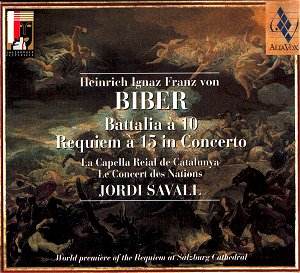Early music in the mid-1990s was obsessed with Venice.
With all the reconstructions of great moments in the history of that
favoured republic, ranging from Eliot Gardner's Monteverdi Vespers
recorded in St Mark's Basilica, through Paul McCreesh's Venetian
Coronation and Robert King's Lo Sposalizio Ascension Day
Ceremony recreation, to McCreesh's Music for San Rocco recorded
beneath the great Tintoretto canvases of the Scuola Grande of
the same name, it certainly appears as if Venice was the last word in
grand ceremonial. But it wasn't. Around the same period of the High
Baroque in the mid-17th century the sovereign Archbishopric of Salzburg
was a centre of counter-reformation majesty, helped by the completion
of the great cathedral in time for the celebrations of the 1100th anniversary
of the founding of the See. For that occasion Heinrich Biber, Salzburg’s
greatest musical luminary before Mozart, composed his vast 53 part Missa
Salisburgensis. Paul McCreesh and his Gabrieli Consort recorded
it for Archiv in Romsey Abbey, but Ton Koopman was able to go one better
for Erato with a live recording in Salzburg Cathedral itself. This new
Alia Vox recording of the 15 part Requeim follows in that mould, and
if recording Venetian music in St Mark’s was sumptuous, recording Salisburgensian
music in the enormous spaces of the baroque triumph that is Salzburg
Cathedral is something else altogether.
The 15 part Requiem was most likely composed for the
funeral of the man who was probably the greatest ruler Salzburg ever
had, Prince-Archbishop Maximilian Gandolph, Biber’s patron and a great
promoter of the arts in general, who died suddenly on 3 May, 1687. He
lay in state for six days, before being carried in procession to his
cathedral where this solemn Requiem was performed, having been composed
and rehearsed in the intervening six days. Biber must be considered
the major musical figure between Monteverdi and Bach and the more of
his sacred works that become available on recordings the more this view
will be confirmed. The Requiem à 15 may have been composed quickly,
but it shows no signs of it at all. It is unusual in several ways, not
least the key of A major (Biber’s other later Requiem is in the more
sombre key of F minor) and the inclusion of two festive trumpets and
timpani. While Biber considers aspects of death at various times in
this work the overall feeling is not one of sombre mourning but, possibly
befitting a great and genuinely much-loved ruler, of calm grandeur and
the confident assurance of victory and heavenly glory.
Biber understood these things, and so too does Jordi
Savall. This writer has long been a fan of Savall and his various groups,
but still he never ceases to amaze. There is something of a Midas Touch
in the man’s work. Maybe he just surrounds himself with the best musicians
to be had and lets them do their thing, but considering that this Requiem
was recorded live it is a remarkable performance. Certainly one would
expect excitement and drama from a live performance, but to get all
that together with a perfection of intonation and pacing, and a polish
and blend in both the instrumental and vocal ensembles almost defies
belief. The thing that is most exciting here is the tangible atmosphere
of the great space inside Salzburg Cathedral. The Mass opens with a
Marcia Funebre for trumpets and drums, representing the procession
arriving in the Cathedral. This opens with slow drum beats ringing around
the huge acoustic in a most unsettling way. The spaces really are vast
and the resonance can be nothing but a nightmare for the recording engineers.
What is even more remarkable is that the photos in the very glossy packaging
clearly show that the performers were distributed in front of the high
altar and in the four organ lofts that surround the crossing. These
are a good twenty feet up, and separated by huge spaces. Contemporary
engravings show us that this was how major musical events were performed.
How any sense of ensemble is possible one cannot imagine, but Savall
manages. The whole work proceeds in this stately manner without any
flagging or diminution of the beauty. It is a remarkable achievement.
The disc opens with the more well-known 10 part Battalia
for strings. This work uses several devices that are still considered
‘modern’ in our times - hitting the strings with the wood of the bow;
paper under the strings of the basses to imitate a snare drum, and,
perhaps most shocking of all, the simultaneous rendering of eight folk
songs in different keys and time signatures to illustrate drunken soldiers.
It sounds avant garde now; how it appeared in 1673 we can only
imagine. This is a 2002 recording, not made live, but in a generous
acoustic nonetheless. The playing is as sprightly and polished as one
would expect and the ensemble is suitable tight and vigorous. It is
somewhat surprising that the overall effect is not as exciting as one
would imagine it would be, given the interpreters. It is certainly extremely
listenable, but the presto is not breakneck speed, and the snap
pizzicato doesn’t feel so tangibly dangerous. Maybe one ends up expecting
too much of every Savall performance, but this is one work where the
extremes he does so well really do seem to be there for the exploring.
The feeling is just a little tame.
Even if the Battalia were not there at all and the
disc was only 44’ long it would be worth every penny for the Requiem
alone. Presentation is of the usual Alia Vox high standard. There is
an informative booklet essay - a little too heavily weighted towards
the much shorter Battalia than seems really necessary - and a good selection
of colour photos, all in attractive design. But how one would have loved
to be there at the concert! The recording is the next best thing.
Peter Wells

